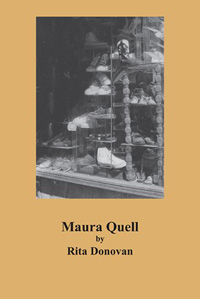Reviews
Fiction Review by Theresa Kishkan
Rita Donovan, Maura Quell (Ottawa: BuschekBooks, 2013). Paperbound, 216 pp., $17.95.
Most families have a story, half-remembered, of an ancestor who did some amazing thing. Or might not have done it, but still the story catches the collective familial imagination somehow. In my case, it was a grandmother who may have shot salmon in a western Washington river to feed her hungry family after being sold worthless land. She took the same gun to the land speculators to demand her money back before returning to Alberta and the rest of her life, which was quite ordinary in contrast. At least this is how the story travelled down the decades and into a new century, to me. But of course stories have the ability to shape-shift, to transform themselves—and those who care to examine them closely.
Rita Donovan’s novel is a meditation on the trope of the scarcely-known ancestor. Maura Quell is the name Aris Sandall’s grandmother summons to warn against disobedience or recalcitrant behaviour. “Aris, you haven’t finished your cauliflower. Mind you do. You don’t want to end up like that girl, Maura Quell.” In some admonishments, Aris’s grandmother intimated that Maura had been a prisoner (just the thing to strike fear into a child’s heart). But no one knows much about this girl. Did she actually exist?
In alternating chapters, the story of Maura Quell, related vividly in the first person, shadows Aris Sandall’s contemporary quest for her. Aris, now forty-nine years of age, is in the midst of a mid-life crisis. She is divorced, working as a copywriter (describing in simple terms the workings of various medical implants: pacemakers, stents, even artificial hearts), and her doctor recommends that she take up a hobby. She decides to search the records at a large reference library to try to locate Maura Quell. The reader follows this quest both through the strangely capricious world of librarians and request-forms as well as by following Maura’s own harrowing transportation from England across the oceans to New South Wales via a converted warship, the Canada. (Her crime? She stole a shirt.)
Donovan has done an exemplary job of creating and sustaining the two narratives. In tone and texture, each is inflected by the voice of its central character. Aris is intelligent but embittered by the events that have shaped her life. Fragments of the texts she is working on echo as she eats her breakfast, works at a computer terminal in the library: “The patient with multiple health concerns needs to be vigilant when it comes to maintaining a balance...” Maura is a bright and curious survivor, burdened by the knowledge that her own inattention might have led to the death of her younger brother, Eugene. “He is there, of course, his yellow sleeve almost a late leaf, but his fair hair is no nest, no blossom... Eugene! O, where have you got to? You do hide so well.”
Reading court transcripts and other documents help Aris to piece together a fragmentary picture of Maura and where she ended up—but does she come to an understanding of how Maura fits into her own family’s history? And is it enough to discover the small details that outline a life long-forgotten, apart from a name used to convince a child to behave? “Aris has coaxed tidbits out of files and proceedings. Maura exists there, on the boat, there, in the harbour, because Aris insists she does. Because she wills it, employing her own heart to make Maura’s beat. Turn away, and the girl disappears.”
One of Maura Quell’s unexpected gifts is her ability to read. And if Aris’s inner texts come from the descriptions of the medical conditions that form part of her contract work, then the correlative passages in Maura’s chapters are from the Bible. When her shipmates find out she can read, they ask her for regular recitations and these play themselves over and over in her head, in her conversations with her dead mother:
“I am remembering, Mother, the part from Lamentations. What is it?
He hath set me in dark places, as they that be dead of old
He hath hedged me about, that I cannot get out: he hath
made my chain heavy.
Also when I cry and shout, he shutteth out my prayer.”
The two narratives tentatively approach one another toward the end of the novel. Aris decides to travel to Australia to search the records there, having learned that Maura Quell was incarcerated in the Parramatta Female Factory. And Maura finds her own way into history. Each character has revealed both strengths and weakness; each demonstrates a capacity for self-preservation beyond what the reader initially might expect. There are murders and at least one theft. Innocence, whether in the early nineteenth century or the early twenty-first, is a relative quality. The reader knows the true nature of Maura Quell, if not her ultimate fate. A runaway in Australia, heading for the Blue Mountains in the company of the one friend she made onboard the Canada, Maura says, “We’re pulling away from the world. Feel how light we are...” This is the place she occupies in both memory and the archival record—a lightness, almost insubstantial (a phantom) but with just enough weight to leave a small trace. We wonder if this will also be Aris Sandall’s legacy to future generations: a name, her own, to haunt imaginations as yet unborn.
—Theresa Kishkan









